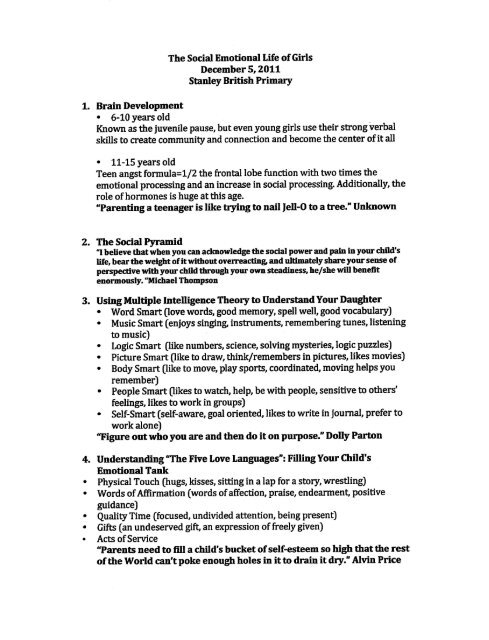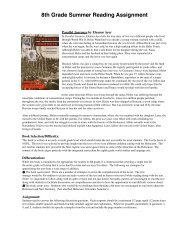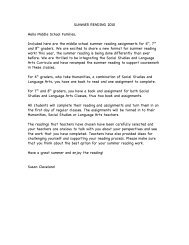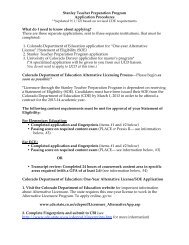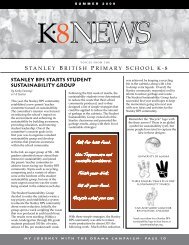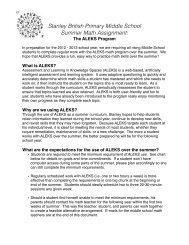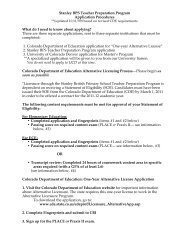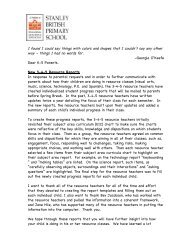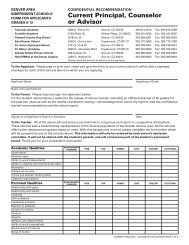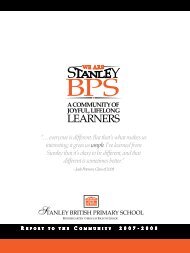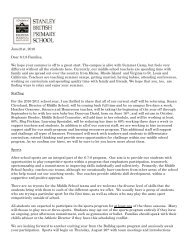Copies of the handouts from each presentation are available here.
Copies of the handouts from each presentation are available here.
Copies of the handouts from each presentation are available here.
Create successful ePaper yourself
Turn your PDF publications into a flip-book with our unique Google optimized e-Paper software.
Boys on <strong>the</strong> Playground<br />
Stanley British Primary School<br />
Dr. Daniel Hettleman, Ph.D.<br />
October 31, 2011<br />
I. Exercise<br />
II.<br />
III.<br />
IV.<br />
What distinguishes <strong>the</strong> play <strong>of</strong> boys<br />
• Sex-typed play choices can be seen as early as 2 years <strong>of</strong> age.<br />
• Boys spend more time playing with blocks, transportation toys, guns, and manipulative<br />
objects;<br />
• Boys connect through action<br />
• Boys tend to play in large groups in large spaces<br />
• Boys and girls start playing primarily with <strong>the</strong>ir own gender starting at age 2-3, and this<br />
continues until 11-12, when it starts to cross gender again more.<br />
The playing field <strong>of</strong> friendships<br />
• Equal status<br />
• Movement away <strong>from</strong> family<br />
• Development <strong>of</strong> negotiation, empathy, collaboration, assertion, problem-solving skills<br />
• Intrinsic motivation<br />
• Free <strong>from</strong> external rules<br />
• Allows children to master fears<br />
• Develop problem-solving skills<br />
Common types <strong>of</strong> play among boys<br />
a. Building/Manipulating: sand structures, snowmen, climbing, intricacy<br />
i. Goal: growing, ambition, achievement motivations, development <strong>of</strong> mastery<br />
ii. Challenges: everything falls, everything breaks, starting over<br />
b. Rough and tumble: wrestling, king <strong>of</strong> <strong>the</strong> hill, banter.<br />
i. Goal: healthy expressions <strong>of</strong> aggression, constrained aggression, establishing<br />
hierarchies.<br />
1. Hierarchies actually reduce aggression<br />
ii. Challenges: feeling less strong, having to become more assertive (if you’re timid);<br />
learning to become more sensitive/generous if you’re an alpha male; coping with<br />
your place in <strong>the</strong> hierarchy<br />
c. Game playing: competition, sports, board games<br />
i. Goal: healthy expressions <strong>of</strong> ambition, aggression, learning/negotiating rules,<br />
playing fair, learning your strengths and weaknesses, development <strong>of</strong> mastery<br />
ii. Challenges: losing. Feelings <strong>of</strong> inferiority. Being an obnoxious winner.<br />
d. Imaginative play: role playing games, drama<br />
i. Goal: development <strong>of</strong> roles, flexibility <strong>of</strong> roles, delegation, negotiation, empathy<br />
ii. Challenges: negotiation, sharing power<br />
e. Flirtation: teasing, touching, looking (later elementary school and middle school)<br />
i. Goal: first attempts in this new, exciting, intimidating playing field.<br />
ii. Challenges: feeling too shy, too promiscuous.<br />
TALKING TO YOUR KIDS ABOUT PLAYGROUND RELATIONSHIPS
I. P<strong>are</strong>nt roles already established<br />
a. Attachment/empathy! safety, exploration, sensitivity<br />
b. Neighborhood/school/culture<br />
c. Arranging play dates<br />
d. Modeling<br />
e. Advice, support, strategies<br />
II.<br />
III.<br />
WHEN YOUR CHILD IS TOO ROUGH<br />
a. Strong feedback. With oomph. Brief but pack a punch. You need to mean business.<br />
• “That’s mean.” “That’s not acceptable in our family.”<br />
• “We don’t want our family members to act that way.”<br />
• “We don’t treat o<strong>the</strong>r people that way.”<br />
• “I know you’re a great soccer player, but we expect you to encourage your teammates<br />
ra<strong>the</strong>r than tear <strong>the</strong>m down.”<br />
• “When you’re mad at somebody, we expect you to find a more appropriate way <strong>of</strong><br />
dealing with it.”<br />
b. Be c<strong>are</strong>ful <strong>of</strong> your and your spouse’s own domineering ways, intrusiveness, inflexibility.<br />
Model/t<strong>each</strong> negotiation, compromise, empathy.<br />
• “Let me think, I really want to watch Dancing with <strong>the</strong> Stars right now, but you want to<br />
watch <strong>the</strong> Rockies game. Let’s think <strong>of</strong> a compromise.”<br />
• “I’m really sorry I was cranky this morning. I was in a rush, and was stressed about<br />
something <strong>from</strong> work and I took it out on you. You didn’t deserve that.”<br />
• “I really want to scream right now. Let’s take a few minutes away <strong>from</strong> <strong>each</strong> o<strong>the</strong>r so I<br />
don’t do something I’ll regret later.”<br />
c. Consequences!<br />
• Action speaks louder than words. Lectures almost never help.<br />
• Providing your child with an opportunity to be powerful, have impact (INCLUDING A<br />
NEGATIVE IMPACT!)<br />
• Expectation <strong>the</strong>y’ll work out <strong>the</strong> problem with <strong>the</strong> o<strong>the</strong>r kid(s).<br />
WHEN YOUR CHILD IS NOT ROUGH ENOUGH (TOO TIMID)<br />
a. Do NOT oversympathize or demonize <strong>the</strong> o<strong>the</strong>r kid (who’s just being his monkey self)<br />
• You CAN label <strong>the</strong> o<strong>the</strong>r person’s behavior as “mean”, “rough”, “not nice”<br />
• Although <strong>the</strong>y may not be able to OVERpower <strong>the</strong> o<strong>the</strong>r child(ren), we can t<strong>each</strong> <strong>the</strong>m<br />
about personal power.<br />
b. Help <strong>the</strong>m see <strong>the</strong> overly rough child’s insecurities, explain what that’s about, how that child<br />
gains temporary pleasure by diminishing o<strong>the</strong>r children.<br />
c. Access <strong>the</strong>ir personal power.<br />
• Use analogies, stories, books, folktales <strong>from</strong> your cultural tradition, e.g Wizard <strong>of</strong> Oz<br />
• Ask <strong>the</strong>m to imagine what <strong>the</strong>y’d do if <strong>the</strong>y felt just as strong “in <strong>the</strong>ir heart” as <strong>the</strong><br />
o<strong>the</strong>r child.<br />
• Ask <strong>the</strong>m what <strong>the</strong>ir younger sibling has done to make sure <strong>the</strong>y (<strong>the</strong> older sibling)<br />
don’t always have too much power; use that as an example.<br />
d. Tell <strong>the</strong>m <strong>the</strong> consequences <strong>of</strong> not standing up to o<strong>the</strong>rs.<br />
• You feel weaker, less powerful, less likely in <strong>the</strong> future to stand up to <strong>the</strong> o<strong>the</strong>r.<br />
• The o<strong>the</strong>r kid becomes more likely to be mean to you in <strong>the</strong> future.<br />
e. Help <strong>the</strong>m access allies.<br />
• Who else in your class has trouble with that boy? Can <strong>the</strong> two <strong>of</strong> you work with <strong>each</strong><br />
o<strong>the</strong>r on standing up to him?<br />
• Involve t<strong>each</strong>ers only when a pattern has been repetitive and your child has not been<br />
able to access his internal power.<br />
f. Get absurd: Humor increases flexibility/creativity.


